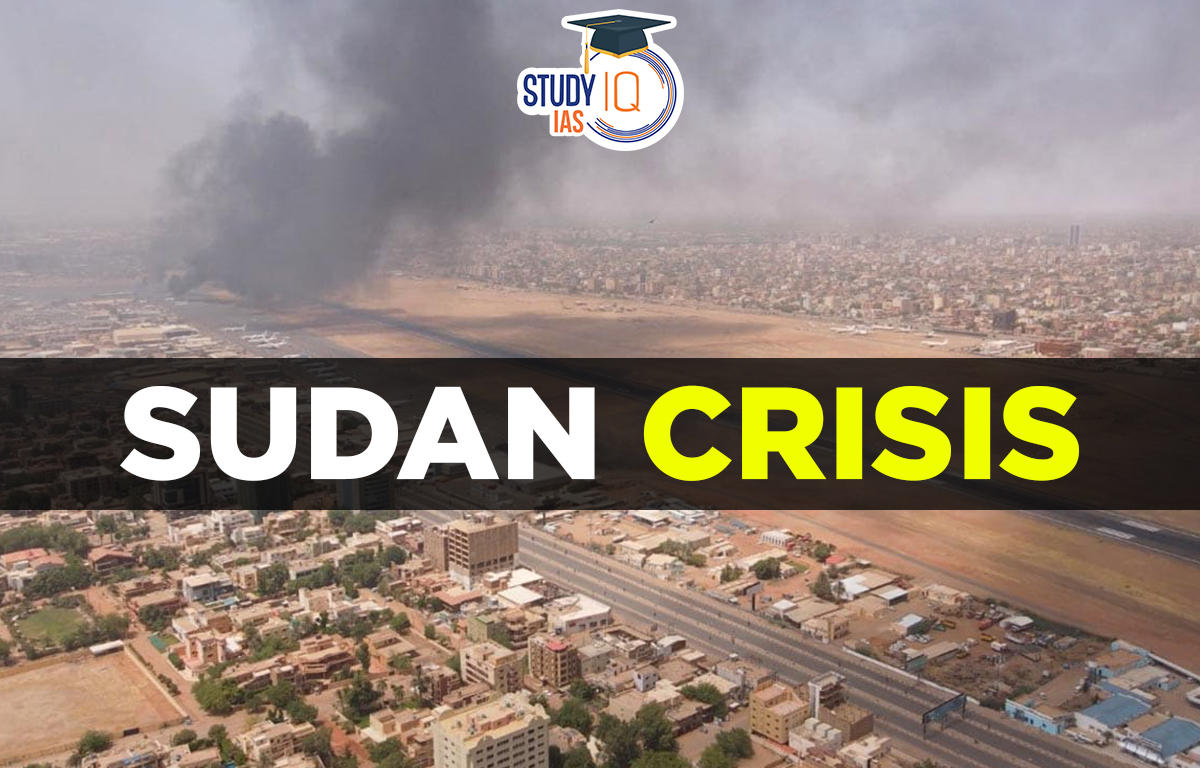Table of Contents
Context: The Prime Minister of India has asked officials to prepare a contingency plan to safely evacuate Indians stuck in Sudan amid clashes between the army and paramilitary forces.
Where is Sudan?
- Sudan is a country located in northeastern Africa.
- Sudan’s capital, Khartoum, is located roughly in the centre of the country
- The country is dominated by Muslims, most of whom speak Arabic and identify themselves as “Arabs.”

Sudan Crisis Background
- 2019 Coup: Former Sudanese dictator Omar al-Bashir, an ex-army officer, came to power in a military coup. Al-Bashir overthrew a democratically elected government in 1989 and remained in power until he was removed from the position by the Sudanese military in 2019.
- Transitional Government: Initially, the military refused to give up power. But as popular protests continued, they agreed to take part in a transitional government made up of both civilian forces and army officers. The transitional government was supposed to remain in charge until democratic elections could be held in 2023.
- 2021 Coup: There were growing divisions within both the civilian and military sides, as well as increased competition between them. In 2021, the military element of the civilian-military coalition seized full control of the country.
- In 2021, the Sudan Armed Forces (SAF), led by General Abdel Fattah al-Burhan, took control of the government in a military coup.
- The Rapid Support Forces (RSF), led by General Mohammed Hamdan Dagalo has worked alongside the Sudanese army to help keep the military in power.
- Recent Crisis between SAF and RSF: The SAF leader Burhan is more inclined towards a transition to civilian rule under international pressure while RSF leader opposed this. Moreover, Burhan wants the RSF to come under a unified command of the SAF.
Indian Diaspora in Sudan
- India and Sudan: India-Sudan relations go back in history to the time of Indus Valley Civilizations.
- India and Sudan have almost 30 bilateral agreements covering trade, science and technology, media, culture, consultations, business, small industries, legal matters, air services, agriculture.
- Indians in Sudan: Indians are working as professionals in key sectors of the Sudanese economy. There are a few Indian civilian officers working in United Nations missions in Darfur and in Abyei in addition to other UN organisations. The Hakki Pikki tribe of India has also registered its presence in Sudan.
- Importance of Indian Diaspora: The Indian diaspora plays a role of facilitator in globalising the Indian trade/export through their global network and bringing investment.
- Diasporas are symbols of a nation’s pride and represent their country internationally.
- Foreign remittances are a vital source of household income in India. They aid in socio-economic development and poverty reduction.
- They serve as an important ‘bridge’ to access knowledge, expertise, resources and markets for the development of the country of origin with the rest of the world.
Why Hakki Pikki Tribe is in Sudan?
- There is a huge demand for Ayurvedic products in the African continent. As the Sudanese were unable to afford expensive ‘English medicines’, they had been looking for cheaper and effective alternatives.
- The Hakki-Pikkis have traditional medical knowledge and the community members have been travelling to the continent for the last many years. They carried the herbs and other medicines required for the treatment from India and sold the items there.
- The African countries offer the Hakki Pikki Tribe an opportunity to escape poverty faster as there is growing demand for their products in the African continent.
How will India Evacuate Indians stuck in Sudan?
- India is preparing contingency plans to evacuate its 3,000-odd citizens stuck in Sudan.
- As part of an effort to explore all options, the Indian government is maintaining close communication with neighboring countries in the region and those with a significant number of citizens in Sudan.
- The plan is to bring back Indians with other evacuation efforts through the Red Sea coast.
- The Indian authorities were in touch with the ‘The Quartet’ countries — U.S., U.K., Saudi Arabia and UAE — to ensure the safety of Indian nationals in Sudan.
- India is also working with the UN, which has a substantial presence in Sudan.
- India has set up a dedicated Control Room for the nearly 1,500 Indian nationals who are caught in multiple locations across Sudan.
Way Forward
- As Indian diaspora is a major contributor in the country becoming a soft power, ensuring the safety and security of Indians stranded in Sudan through international mediation becomes very cardinal.





















 WhatsApp
WhatsApp